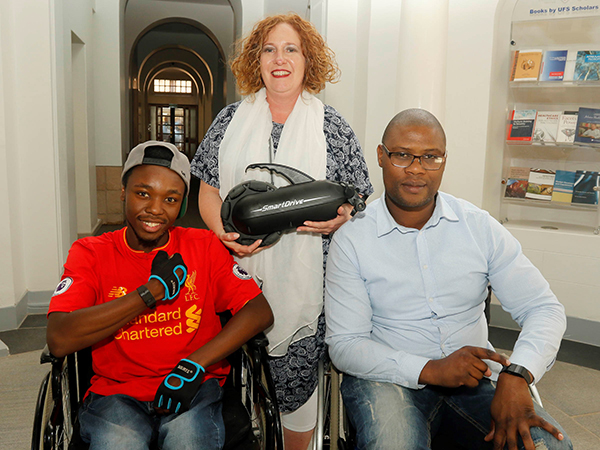Latest News Archive
Please select Category, Year, and then Month to display items
11 June 2021
|
Story Rulanzen Martin
|
Photo Courtesy of artists and the Johannes Stegmann Gallery.
![]()
Liminality is an exhibition of first-, second- and third-year student’s work in the
Department of Fine Arts at the University of the Free State (UFS). The works are from 2019 and 2020. Created during the hard lockdown of 2020, the artworks provide a glimpse of what students had to deal with and overcome during these times.
In a proposal for the exhibition, Angela de Jesus, Curator of the UFS Art Galleries, wrote: “The subtitle of the exhibition is ‘threshold, transition, transformation’ and it refers to the creative processes that students engaged with
in these adverse circumstances resulting in a wide array of artworks in both traditional and adapted mediums.”
The exhibition speaks to our shared experiences of insecurity, fragility, and discord, and to the resourcefulness and immutability of creative expression.
The virtual exhibition runs until 2 July 2021.
The exhibition is also currently available for viewing at the Johannes Stegmann Art Gallery, Sasol Library, UFS Bloemfontein Campus. Monday - Friday 09:00 - 16:00.
 MEGAN JOHNS, Battleground, Tobacco, charcoal dust, plaster of paris and resin, 93.5 x 50 x 7.5 cm
MEGAN JOHNS, Battleground, Tobacco, charcoal dust, plaster of paris and resin, 93.5 x 50 x 7.5 cm
 JACOBETH SELINGA, Linda, Installation: Found bed, wool and thread, 257 x 196 x 91 cm
JACOBETH SELINGA, Linda, Installation: Found bed, wool and thread, 257 x 196 x 91 cm
 POLOKO MOHANOE, Prayer for rain, Gouache on Fabriano, 66 x 72.8 cm
POLOKO MOHANOE, Prayer for rain, Gouache on Fabriano, 66 x 72.8 cm
 SEBOTSE SELAMULELA, In my image (Coronavirus head), Clay, 35 x 40 x 60 cm
SEBOTSE SELAMULELA, In my image (Coronavirus head), Clay, 35 x 40 x 60 cm
 WILLIAM SHAER, Creator, Deconstructed chair, koat wood and Imbura wood, 100 x 75 x 45 cm
WILLIAM SHAER, Creator, Deconstructed chair, koat wood and Imbura wood, 100 x 75 x 45 cm
 Johannes Stegmann Gallery
Johannes Stegmann Gallery
 Interior of the Johannes Stegmann Gallery
Interior of the Johannes Stegmann Gallery
SmartDrive devices give UFS wheelchair users more independence
2017-12-01

From the left, are: David Mashape; Martie Miranda, Head of the
Center for Universal Access and Disability Support at the UFS;
and Lawrence Qamba, celebrating the recent acquisition
of two SmartDrive Power Assist devices.
Photo: Johan Roux
Students who make use of wheelchairs at the University of the Free State (UFS) will now be able to move around campus more independently than before. This is thanks to two SmartDrive Power Assist devices acquired by the university.
Accessibility is very important to the institution and with these devices clipping onto a manual wheelchair to make it motorised, students will not have to ask for help that often. It will assist them in overcoming obstacles they face every day.
Different surfaces pose different challenges
According to Martie Miranda, Head of the Center for Universal Access and Disability Support (CUADS), one of the most important advantages of the SmartDrive machines is that it enhances the independence of students. The devices were bought with funds received from the Department of Higher Education and Training specifically allocated for accessibility and infrastructure.
“While the UFS is addressing inaccessibility on its campuses, which will take time, this will help to motorise wheelchairs for wheelchair users to move around more easily. Students can now move around independently without necessarily asking for help, for example, to get up very steep ramps.” Miranda says some surfaces, such as grass and gravel, has its own unique challenges for wheelchair users.
A few years coming
The SmartDrive devices are operated by a Bluetooth watch. By tapping twice on the chair or clapping twice, the motor propels the wheelchair forward and stops when tapped twice, while also braking with one’s hands. The speed can also be controlled by the user. The machines use rechargeable batteries, with a fully charged battery lasting up to 15 hours.
Acquiring the devices was a process of a few years, and CUADS is happy to finally employ them to the benefit of their students. Miranda says the determination and support of Prof Nicky Morgan, Vice-Rector: Operations, and the assistance of Nico Janse van Rensburg, Senior Director: Top Management, were instrumental in buying the devices.